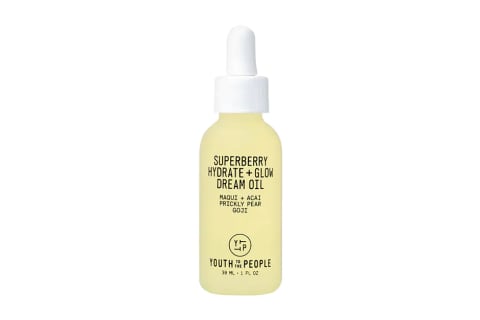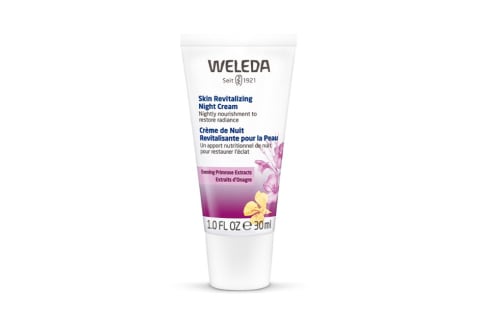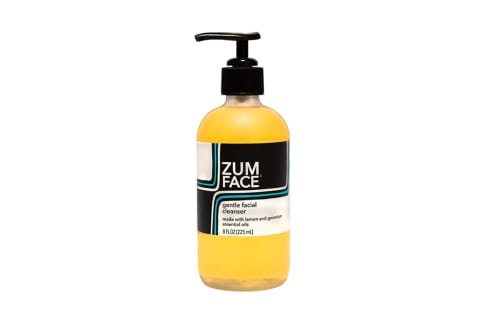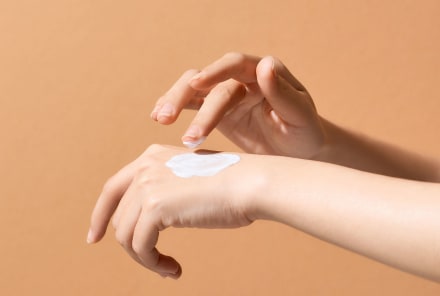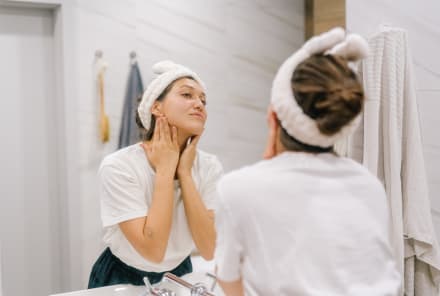Advertisement
Olive Oil For Skin: 9 Uses & Benefits From Dermatologists


I'm going to make a wager that you're no stranger to olive oil: Whether it be through cooking, dipping bread, slicking it through your hair, dabbing a bit on your cuticles, or any number of various odds and ends the multitasker is known to be useful for. And the oil certainly makes the rounds for good reasons: It's full of good-for-you nutrients.
And as for the skin: There are plenty of reasons to add this to your routine—just be mindful of how you use it, as it may not be the right oil for everyone (everyone reacts differently to ingredients!).
So once you've found your go-to (10 high-quality options here), what's next? We outlined the best skin care uses and benefits here so you'll know exactly what to do.
What is olive oil?
Olive oil is a liquid fat obtained from olives. Though "extra-virgin" seems to be slapped across countless bottles at the market, not all oils are created the same. Cooking and skin care alike, you should look stick to high-quality, extra-virgin olive oil.
You can even test your oil to make sure it's premium enough to use, as many commercial options blend the oil with additional, lower-quality oils—learn more here.
One of the reasons olive oil is so skin-loving is because of the omega content. Olive oil contains omega-6 and omega-3 fatty acids, which can help support a healthy skin barrier1 and seal in moisture for ultimate hydration. Now let's dive into the different uses for this superstar oil.
Makes for a natural makeup remover
Removing stubborn makeup—you know, the common culprits like mascara and waterproof products—is a pain. Often, people will reach for wipes or cotton rounds doused in makeup removers. You can skip all that and just go straight for this kitchen staple. When used as a natural makeup remover, olive oil can help dissolve the oil in your makeup products (oil attracts oil and water attracts water, remember).
To use oil as a makeup remover, we recommend massaging the oil of your choice in circular motions, then rinsing with warm water. Feel free to stick to that as your cleansing step in your skin care routine (especially if your skin is parched dry) or proceed with a water-based cleanser for a double-cleanse. Speaking of double-cleansing.
Use it as an oil cleanser or double-cleanse.
Skin care enthusiasts swear by oil and double-cleansing methods—for clear, supple, soft skin—that won't strip away your barrier.
First up, why you should be washing your face with oils. "Oil cleansing can be a total game-changer for just about any skin type and condition," explains aesthetician Britta Plug. "Although it may seem counterintuitive to wash your face with oil, it's actually brilliant."
Here's how it works: "An oil cleanser dissolves excess oils on your skin—without any of the surfactants, harsh ingredients, or necessary preservatives in foaming cleansers. This means that your face gets a super-deep clean, without any 'stripping,' or disruption of the skin's natural microbiome," Plug said.
As for double cleansing, it is simply the process of washing your face first with an oil cleanser, then a water-based cleanser.
Esthetician Hannah Brady, who works with Credo, adds that "beginning with an oil cleanse on dry skin will help remove the day and also soften the drying effects of a gel or foam cleanser."
Essentially, starting with olive oil will not only help you get a deeper clean, but it can mitigate any stripping effects of a water-based cleanser that you might follow it with.
You can also simply stick with just the oil cleanse (if you have dry skin), but those with acne or combination skin will prefer to follow it up with a standard cleanser.
Seals in moisture.
Your skin barrier function is of the utmost importance: When it's compromised, you'll experience dryness, irritation, sensitivities, and inflammation. Essentially, a good barrier begets a good complexion.
You can tend to your skin barrier in a variety of ways—from balancing your microbiome to soothing irritation—but one of the most meaningful ways to help it is to seal in moisture.
Olive oil has occlusive properties, which means that it acts as a sealant, trapping in water and blocking external aggressors. When used on top of damp skin or over a water-based product, it "moisturizes" skin by helping keep the hydration in2. (Olive oil doesn't have moisturizing qualities intrinsically, as it contains no water, but it does help the moisturizing process nonetheless.)
Acts as an antioxidant.
Olive oil is notably high in vitamin E, a fat-soluble antioxidant that has impressive free-radical fighting abilities. This likely accounts for the fact that studies have shown the oil has anti-inflammatory properties3, meaning it can help soothe irritated skin and manage oxidative stress. This is an important benefit, as inflammation is one of the main causes of collagen breakdown, dark spots, and premature aging.
Aids in wound healing.
According to anecdotal reports and some research, applying the oil topically can speed up wound healing4. This is also likely tied to the high vitamin E content, as the antioxidant has been shown to reduce the appearance of scars, including those due to acne or surgery. The nutrient might also benefit scar formation during healing by interacting with lipids in cell membranes.
A simple cuticle oil.
Keeping your tips healthy and polished is no easy feat, especially with hand washing and in the colder months. One way to make sure your fingers and nails stay in top shape is to regularly apply cuticle oil. But you don't have to go out of your way to find one: Just dab a few drops of olive oil on and gently massage it in.
It can be a great scalp oil
Don't forget: Your scalp is skin and should be treated as such. One way to aid a dry scalp is to gently massage in oils on a regular basis.
Here's a quick how-to: "Use your finger pads (not nails) to apply medium-firm pressure to your scalp, in a circular motion," says board-certified dermatologist Raechele Cochran Gathers, M.D., who specializes in hair care and founded MDHairMixtress. "They can be done daily or weekly for about five minutes."
After, you'll likely want to rinse it out, as it can be heavy and weigh down your roots or cause buildup—but feel free to let it sit for a while, even overnight, so your skin can really drink up the antioxidants and nutrients.
However, be mindful if you have dandruff. There are many claims that it can help with dandruff by moisturizing flaky, scaly patches, but most dermatologists refute this. According to board-certified dermatologist Whitney Bowe, M.D., "Dandruff is caused by a yeast on our scalp, and if you use olive oil, you are feeding that yeast, which might make dandruff worse."
A useful carrier oil.
Carrier oils are the oils you blend with essential oils before applying EOs cosmetically. Since EOs are so potent and volatile, you can't put them directly on your skin (nor will they absorb this way), so instead, you cocktail it with a carrier.
Essential oil expert, author, and teacher Amy Galper previously told mbg that they can be any sort of lipid-rich extract that can be expelled from a seed, nut, or fruit. In other words, olive oil makes for a great carrier oil, especially for the body.
Makes a great addition to products.
If you take a peek at the label on your skin care products, there's a decent chance that olive oil may be listed as an ingredient. Beauty companies often formulate it into creams, lotions, body products, and so on for all the reasons we mentioned above. This also makes it easier for you to use, especially if you're not one to DIY. All you have to do is find products that contain the ingredient, like the options here!
Cautions about using olive oil on your face:
Everyone's skin is different and reacts uniquely to various ingredients: What clogs some people's pores may be perfectly fine for others. So if you are currently using olive oil on your face, and you have no issues with it, feel free to proceed as usual, no problems.
However, some may find it to be too thick as a leave-on face product, as it is comedogenic. When something is comedogenic, it can cause pore blockage, leading to sebum plugs, blackheads, and pimples. A comedogenic formula or ingredient is usually thick and occlusive—read: olive oil—so it sits on the skin trapping in oil, bacteria, and causing inflammation, which will lead to irritation and eventually a breakout.
Since you rinse off a makeup remover or oil cleanser, using it this way tends not to be much of concern; also when skin care brands formulate olive oil into creams or the like, it's usually buffered with less comedogenic options, making it less of an issue.
If you're looking for a pure oil to use on your face, there are more sensorially and cosmetically appealing options that tend to be better for oil-prone folk, like grapeseed, pumpkin seed, jojoba, or argan oils.
The takeaway.
Olive oil is a multitasking hero that people have used for ages as a beauty enhancer for hair, body, and face. If you're interested in adding it to your routine, there are several ways to do so—just be mindful that it's not necessarily suited to all skin types, as some find it to be pore-clogging and too thick. If you do have blemish-prone skin, perhaps an olive oil hair mask would be a better bet—Here's how to make one.
